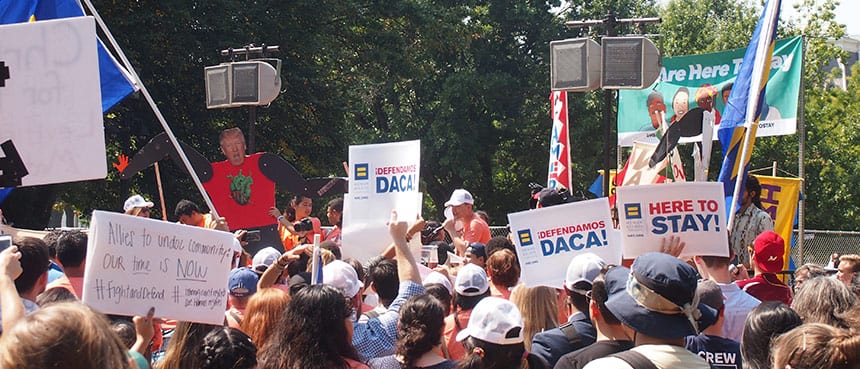What the New DACA Ruling Means for Those Affected
October 19, 2022
The Deferred Action for Childhood Arrivals (DACA) serves as a program to offer privileges to those who do not have legal U.S citizenship. The program – which helps individuals obtain resources such as driver’s permits and/or licenses, social security, and a work permit – protects over 800,000 people, also known as DREAMers.
Established by the Obama administration in 2012, the program has helped eligible individuals to establish their own businesses, gain access to healthcare, purchase houses and cars, and obtain degrees. The program was first proposed as the Development, Relief, and Education for Alien Minor Act, granting legal status to those who came into the country unlawfully. The DREAM Act was denied, however, leading to a temporary establishment of DACA on June 15, 2012.
While DACA has positively impacted the lives of many beneficiaries, complications mounted as the years went on. With the most recent hearing and the new rules set to go into effect on Oct. 30, 2022, the future of DACA — and nearly a million program recipients — remains uncertain.
The Trump administration tried to appeal the program on multiple occasions throughout 2020, though Congress ruled these attempts as unlawful. Nevertheless, there were some changes that managed to gain approval. As of 2020, the Trump Administration had restricted any new DACA applicants, shortened program length, required that renewals must be complete within 120-150 days of application expiration, and required that all travels outside of the U.S. must be approved under a “special circumstance.”
On July 16, 2021, a group of Republican state attorneys from Texas challenged the program in court, arguing that DACA violated federal law, regulated without procedure, and put impending costs on the state. Judge Andrew Hansen ruled the program to be unlawful, suspending all new applications to be approved by the U.S Citizenship and Immigration Services. However, this didn’t mean immediate termination, as Judge Hansen ruled that those who had DACA before July 16, 2022 did not get their application denied or canceled. On Aug 30, 2022, the Biden-Harris administration appealed this decision to the U.S. Court of Appeals. The final ruling changes include:
- No expansion or changes from the eligibility rules in 2012;
- The initial application and employment authorization costs to remain at $495 and $410, respectively;
- Expired or invalidated DACA applications prompts an automatic termination of work authorization by the Department of Homeland Security;
- An expansion of “deferred action” as the use of prosecutorial discretion to defer removal action against an individual for a certain period of time
- DACA recipients are considered “lawfully present,” but do not possess “lawful immigration status.”
As some CSUEB students may rely on DACA for their education and income, many are concerned about what this might mean for their future. “Don’t let DACA get in the way of pursuing your dreams, even if you… have DACA now and it goes away, you should still continue to pursue your dreams. No matter what, your education cannot get taken away,” says Miguel Pimental, the Coordinator of the Undocumented Student Center.
While some may face potential DACA termination, Pimental wants students to know that there are alternatives and resources available. Students can seek legal advice from an immigration attorney, as well as counseling services, for free,
Key points for those who depend on DACA:
- Existing DACA applications are still valid, but new ones are no longer accepted;
- Current DACA recipients are still protected from deportation and are authorized to work;
- There is still a possibility for the ruling to be challenged, but it does not mean immediate effect.







